News & Announcements
- Details
- Written by Joshua Wachtel
 Vidia Negrea, Director of CSF HungaryFrom a new eForum article by Vidia Negrea, Director of Community Service Foundation of Hungary, and IIRP affiliate, about a restorative process used in the transition process for releasing a prisoner who had committed murder:
Vidia Negrea, Director of CSF HungaryFrom a new eForum article by Vidia Negrea, Director of Community Service Foundation of Hungary, and IIRP affiliate, about a restorative process used in the transition process for releasing a prisoner who had committed murder:
The first phase of a three-phase intervention plan involved preparing and running a circle meeting with János and his family to prepare for his temporary release. This hybrid restorative circle came out of my experience with FGDM and less formal restorative circles and was designed to meet the needs of prison officials, the prisoner and his family.
I held preparatory meetings with János in the prison, his partner Mária, their two children and Mária’s parents in her family home. János’s son, struggling with tears, talked about how he had been stigmatized as a small child for what his father had done and how hard it was for him not to respond with violence. Mária’s mother summarized how the family related to János: “I condemn what he did, he committed a crime. But János is a kind man, and we would be happy to have him with us again, as long as his intentions are good. The children need him, and so does Mária, who still loves him.” All five agreed to attend the circle meeting.
- Details
- Written by Joshua Wachtel
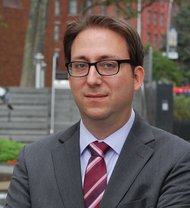 Udi Ofer, photo by Alberto MoralesThe New York Times "SchoolBook" section – "News, data and conversation about schools in New York City" – has an opinion piece about the need for schools to report carefully on who they suspend for what and how frequently. The author, Udi Ofer, writes, "Figures released last week by the City Department of Education show that city schools suspended 5-year-olds at least 35 times and 6-year-olds at least 107 times in the last year alone. That is 142 students who are not old enough to pick out their own clothes but were deemed a big enough threat that they needed to be suspended."
Udi Ofer, photo by Alberto MoralesThe New York Times "SchoolBook" section – "News, data and conversation about schools in New York City" – has an opinion piece about the need for schools to report carefully on who they suspend for what and how frequently. The author, Udi Ofer, writes, "Figures released last week by the City Department of Education show that city schools suspended 5-year-olds at least 35 times and 6-year-olds at least 107 times in the last year alone. That is 142 students who are not old enough to pick out their own clothes but were deemed a big enough threat that they needed to be suspended."
He goes on to suggest that suspending students may not be a cut-and-dried process implemented fairly, and finally suggests alternative means of discipline, including restorative justice:
- Details
- Written by Joshua Wachtel
The Week of November 13, 2011 Is Restorative Justice Week
According to this piece, "'Re-visioning Justice,' the theme for this year's Restorative Justice Week ... calls upon Canadians to envision how a restorative justice approach can be applied and implemented within a broader social justice context. It is a challenge to those who work in the health care, educational, justice, correctional and all other systems and/or levels of government, to be creative and innovative in looking at 'justice' through a restorative justice lens."
A National Restorative Justice Symposium will take place in Kamloops, British Columbia, November 13-15, 2011.
For an up to date google news search of Restorative Justice Week Canada related events click here.
And Restorative Justice Online had this page packed full of information.
- Details
- Written by Joshua Wachtel
"Most striking, students showed higher gains in math achievement when their teachers reported frequent conversations with their peers that centered on math, and when there was a feeling of trust or closeness among teachers. In other words, teacher social capital was a significant predictor of student achievement gains above and beyond teacher experience or ability in the classroom. The effects of teacher social capital on student performance were powerful.”
This is a quotation by Dr. Carrie Leana in an Education News piece, "Julia Steiny: Terrific School Morale Improves Math Scores," which you can read in full here. Feel free to discuss in the comments.
- Details
- Written by Joshua Wachtel
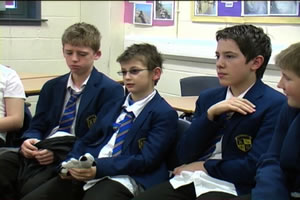 Circle discussion at Endeavor High SchoolAs Hull Centre for Restorative Practice in the UK just completed its Restorative Practice Conference, I'll offer a look back at this eForum story by Laura Mirsky from two years ago reporting on the city's progress toward its goal of becoming the world's first restorative city.
Circle discussion at Endeavor High SchoolAs Hull Centre for Restorative Practice in the UK just completed its Restorative Practice Conference, I'll offer a look back at this eForum story by Laura Mirsky from two years ago reporting on the city's progress toward its goal of becoming the world's first restorative city.
Hull, UK, led by the Hull Centre for Restorative Practices (HCRP) and the International Institute for Restorative Practices (IIRP), is endeavoring to become a “restorative city.” The goal is for everyone who works with children and youth in Hull, one of England’s most economically and socially deprived cities, to employ restorative practices.
- Details
- Written by Joshua Wachtel
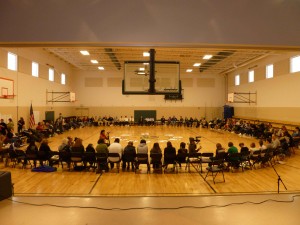 IIRP alum Ben Emery is working with the Colorado Restorative Justice Council and blogs at RestorativeJusticeColorado.org. He writes that he kept hearing about good work happening by the Longmont High School Restorative Justice Team, where teenagers are "facilitating circles, organizing pre-conferences, and even training younger students." When he talked to students about recording an interview about the blog, Sophomore Savannah Iverson stepped in and offered to write a 3-part series. From part 1:
IIRP alum Ben Emery is working with the Colorado Restorative Justice Council and blogs at RestorativeJusticeColorado.org. He writes that he kept hearing about good work happening by the Longmont High School Restorative Justice Team, where teenagers are "facilitating circles, organizing pre-conferences, and even training younger students." When he talked to students about recording an interview about the blog, Sophomore Savannah Iverson stepped in and offered to write a 3-part series. From part 1:
Before I joined the RJ team, I often played supporting roles—whether it was in drama, basketball or even group projects in class. I didn’t really want to speak out or be the leader. I would rather just sit back unless I really needed to. After I joined and started being a more active member, I notice that I automatically took on that leadership role, and I feel confident that I am a good leader. I feel like I know what I am doing, and I recognize what needs to happen and figure out what needs to be done. I am able to analyze the situation better, and think about different outcomes. I am really good at giving options, soliciting feedback from my peers and making sure that everyone has a voice and say. As a group, we usually end up finding a good outcome, and the group as a whole decides what is best. It’s extremely similar to a circle process, the wisdom of the group is really important.
- Details
- Written by Joshua Wachtel
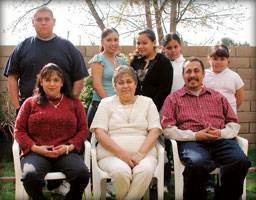 A Family Satisfied with FGDM, from the Famly Voices Video
A Family Satisfied with FGDM, from the Famly Voices Video
IIRP's sister organization and model restorative practices program, Community Service Foundation (CSF) is a nonprofit organization serving delinquent and dependent youth in eastern Pennsylvania since 1977. Recently, CSF completed this report on its FGDM program, which is highlighted on American Humane's "What's New" in FGDM web page.
First, here's a brief description of Family Group Decision Making from the FGDM Outcome Report:
What is a Family Group Decision Making Conference?
A family group decision making conference is a restorative approach to problem solving that involves children, family members, extended family, friends, interested individuals, professionals and invited community resources. A formal meeting is conducted that includes the child and all of the interested people who can support a plan concerning the child. During the meeting, the entire family group works together to create a plan that will be supported by the courts. These plans call for the family group to take responsibility for the child/family in need, with community resources in place to make this possible. It is important to define family loosely, including immediate family, family friends, grandparents, aunts, uncles, cousins, clergy and neighbors. FGDM is a family-centered, culturally competent, strengths-oriented and community-based approach. It recognizes that families have the most information about themselves to make well-informed decisions.
- Details
- Written by Joshua Wachtel
 University of San DiegoUniversity of San Diego's (USD) newspaper, The Vista, has a story by Libby Jelinek about a one-year pilot to establish a restorative justice program on campus. They will be using conferencing in the areas of student discipline and peace circles for working through issues that affect the larger school community.
University of San DiegoUniversity of San Diego's (USD) newspaper, The Vista, has a story by Libby Jelinek about a one-year pilot to establish a restorative justice program on campus. They will be using conferencing in the areas of student discipline and peace circles for working through issues that affect the larger school community.
The one-year pilot program will implement restorative justice conferencing and peace circles to find solutions for issues in the campus community. The restorative justice process focuses on three main goals: to empower, to educate and to build relationships. Throughout the program, students are involved and invested in the decision-making process. The most valuable aspect of restorative justice, according to Darling, is that students learn another way to handle conflict in their lives, such that bringing the offender and impacted parties together can develop what would otherwise be a negative relationship into a positive one.
- Details
- Written by Joshua Wachtel
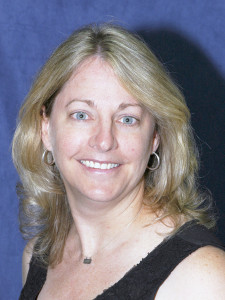 Dr. Carol Thomas, IIRP Assistant ProfessorIIRP Assistant Professor Dr. Carol Thomas recently had an article published in The Prevention Researcher entitled "Supporting the Grieving Adolescent: An Interview with a 21st Century Perspective." Thomas introduced the interview by writing:
Dr. Carol Thomas, IIRP Assistant ProfessorIIRP Assistant Professor Dr. Carol Thomas recently had an article published in The Prevention Researcher entitled "Supporting the Grieving Adolescent: An Interview with a 21st Century Perspective." Thomas introduced the interview by writing:
As individuals enter adolescence, they are confronted with a plethora of changes that occur all at once. Not only are they undergoing significant physical, emotional, and cognitive changes; they also grapple with developing a sense of independence and autonomy, struggle with the pressures of social acceptance and peer relationships, and are adjusting to sexually maturing bodies and accompanying feelings. Experiencing the death of a loved one during this already challenging time of life may leave adolescents confused, angry, or depressed.
- Details
- Written by Joshua Wachtel
Ted Wachtel's keynote from the 2011 European Congress on the Family Group Conference: Democratizing Help and Welfare in Utrecht, the Netherlands, October 19-21, 2011: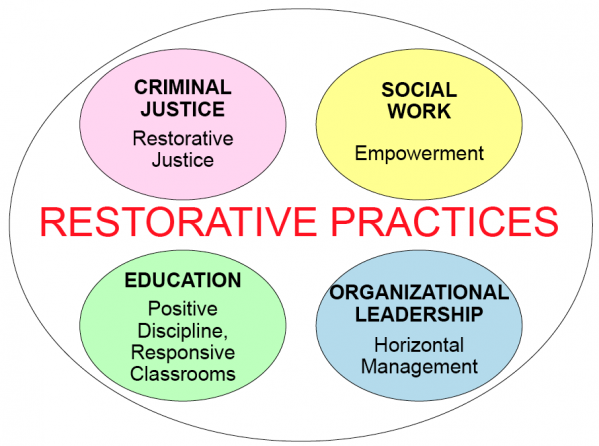
Restorative Practices: Creating a Unified Strategy for Democratizing Social Care, Education and Criminal Justice
I’d like to tell you about the first Family Group Conference story that I ever heard. I heard it in 1994 from an Australian police officer named Terry O’Connell. Terry was traveling around the world on a Winston Churchill Fellowship and he came to where I live in the U.S., in Pennsylvania. When he told this story I was deeply moved. It touched my heart. So much so that Terry said he remembered me because I was the person sitting in the front row with tears running down his cheeks.

Restorative Works Year in Review 2024 (PDF)
All our donors are acknowledged annually in Restorative Works.
